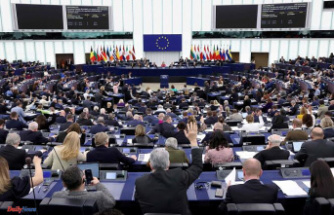Consider moving your clocks and alarm clocks. France will switch to summer time on the night of March 30 to 31: at 2 a.m., it will be 3 a.m. A controversial time change whose removal, desired by the European Commission, looks like a sea serpent.
This measure, introduced for the first time in 1916 before being abandoned in 1944, was reintroduced by a decree in September 1975. It was intended to be provisional and aimed to limit energy consumption in the midst of the oil crisis. With the increase in calls for energy sobriety, the time change could appear beneficial. But is it really?
1. A non-universal and difficult to understand system
At the European level, the time change regime was gradually generalized in the 1980s before being harmonized in 2002. The European Commission proposed in 2018 to eliminate it the following year. But, in March 2019, the European Parliament voted to postpone it until 2021 and had to agree with the Council of Heads of State and Government on the terms of this reform. Since then, between Brexit and the Covid-19 pandemic, the question has remained unresolved. One of the difficulties is to encourage countries to harmonize their legal time (summer or winter) in order to avoid ending up with a patchwork of time zones.
In France, an online consultation organized in early 2019 by the National Assembly received more than two million responses, overwhelmingly (83.74%) in favor of ending the time change. More than 60% of participants claimed to have had “a negative or very negative experience” of the change.
Special feature of the current system: it does not concern overseas territories, which never change time (with the exception of Saint-Pierre and Miquelon, which is based on Canada). Indeed, most of them are located in latitudes where the differences in sunshine are small throughout the year, unlike Europe.
Globally, several countries, such as Argentina, Tunisia, Egypt, Turkey, Russia and Armenia, have decided to abandon seasonal time changes.
2. Inconclusive energy gains
The main argument in favor of changing the time has until now been the energy savings that it would make by taking advantage of longer daylight periods in summer and by getting closer to the rhythm of the sun in winter. But several studies on the subject show “modest” energy and CO2 savings, according to the Environment and Energy Management Agency (Ademe).
Thus, an Ademe study published in 2010 concluded that the switch to summer time leads to:
In other words, households pay, on average, a little more for electricity in the morning, but ultimately save in the evening. To get an idea, one hour less lighting saves about 10 cents.
In 2009 (year taken into account by the study), the average electricity demand at 7 p.m. was reduced by 3.5 gigawatts (GW). In total, the energy savings that year were estimated at 440 gigawatt hours (GWh), mainly on public lighting (in pink in the graph above). That is the equivalent of one year of lighting for a city of 800,000 inhabitants, like Marseille.
But since then, this effect has tended to diminish due to the increased performance of lighting systems (low-consumption bulbs and LEDs). In 2018, this drop was only 351 gigawatt hours. By 2030, energy savings in lighting are estimated at 258 gigawatt hours by Ademe.
Knowing that the majority of household energy consumption comes from heating and not lighting, proof of energy savings therefore remains to be demonstrated. A British study even claims that removing the time change in October would save 400 pounds sterling (460 euros) per household per year, because it would be daylight longer in the evening, reducing demand at peak times.
3. Conflicting results on road accidents
The Association Against Double Summer Time (Ached) is campaigning against the time change, citing, among other reasons, “increases in traffic accidents”. She bases her argument on figures dating from… 1976, after the reestablishment of summer time, and concludes that there were 661 more road deaths that year, between April and October, than in 1975 .
In a report published in September 2014, the European Commission, which reviewed several studies on the subject, noted "often contradictory results", with some reports "suggesting that the change improves road safety", thanks to better visibility at certain times of the year and day (as a 2010 Scottish study explained), others “demonstrate a potential increase in road accidents due to sleep disturbance.”
In 2023, Road Safety has, however, decided to recall the importance of making yourself visible on public roads, with “retroreflective devices (vest, armband, gloves, strips on the backpack, school bag, etc.)” just before the time change. The number of accidents involving a pedestrian in fact increases recurrently by 42% in November, compared to the month of October, according to data from the National Interministerial Road Safety Observatory collected between 2015 and 2019.
4. Health consequences?
In 2008, a Swedish study published in the New England Journal of Medicine, based on statistics from the country between 1987 and 2006, found “a statistically significant increase in the risk of heart attack” in the week following the time change, especially during the transition to summer time.
A September 2015 study, conducted by the European Commission, writes that “health can be affected by the body’s changing biorhythm, with possible sleep and mood disturbances.”
But just as winter depression cannot be explained by a causal link (rather tenuous from a scientific point of view) between lack of light and drop in morale, the disturbances induced by the time change cannot be explained by at present only by hypotheses. The Commission concludes, however, that “the evidence regarding overall health effects (i.e. the balancing of presumed negative and positive effects) is inconclusive.”
In 1997, a Senate report assured that the medical world remained “very divided on the existence of problems attributable to summer time”. True or fantasized, the medical risk was in any case integrated by potential patients: “19% of doctors [reported] an increase in the consumption of medications and particularly tranquilizers at the time of the time change.” An American study on the “social jetlag” of time change, published in 2019, observed populations on either side of a time zone “border”: it concluded that an hour more sunlight in the evening lost up to 19 minutes of sleep.












